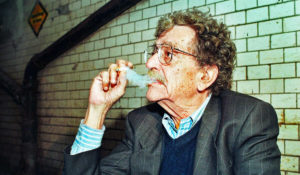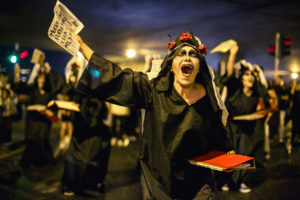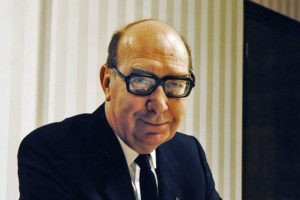I suppose it’s only a matter of time before the times catch up with George MacDonald Fraser’s Flashman books. One can imagine the scene: an earnest young editor picks up a copy of the books, drawn to them by the enthusiastic plaudits on the jackets, waiting for that “watcher-of-the-skies-when-a-new-planet” feeling promised by the blurb from the sainted P.G. Wodehouse.
At first, the book is promising. Its central conceit is inspired: suppose one were to take up from Thomas Hughes’s worthy Victorian classic of boarding school life, Tom Brown’s Schooldays, a relatively minor character — a bully called Flashman — and imagine his life after he was expelled from Rugby. Suppose one were then, ingeniously, to place him in every major colonial (mis)adventure of the Victorian age, starting with the first Afghan War. Suppose one were to keep his original attributes (his cowardice, his intemperance, his spectacular selfishness) but combine them with some useful gifts (for riding, for picking up new languages). Would that not be a neat way to write a historical novel, mixing up the real characters with the invented, and presenting the whole story as the recently-discovered memoirs of a genuine Victorian military hero, reflecting in old age on his ill-spent life — lying, shirking, philandering?
But a couple of chapters in, the racial slurs are flowing like water; the copious sex is entirely consensual only, at a generous estimate, 60% of the time. The tone is that of a romp, the British Empire depicted as a setting in which defrocked public schoolboys might find themselves a little adventure. Reading the author’s words in his own voice does not help. His breezy defences of his hero’s racism, in an essay that appears in most recent editions of the books, are staggering in their complacency: “of course he is [racist]; why should he be different from the rest of humanity?” Aren’t these books seriously… problematic?
There is a case for seeing this hypothetical editor’s views as having a certain integrity. After all, they reflect a hard-won contemporary consensus about the wrongs of both racism and sexism. But they also reflect a trend authors will know well from their recent interactions with editors and agents: the view that to publish a book is to be willing to take responsibility for its contents, as if one had written it oneself. That means, effectively, that an editor’s ambivalence about the morals of a book or its characters are enough to justify not publishing it.
In their insistence on judging the value of a work of art principally in terms of its moral qualities, the publishers of today are heirs to a tradition of puritanism going back to Plato. But there has long been an anti-puritanical argument available too, the most notorious of them being the one articulated by Oscar Wilde: that to assess art in moral terms is to commit some sort of category mistake. “There is no such thing as a moral or an immoral book. Books are well-written, or badly written. That is all.” But that argument was never very persuasive by itself, and contains a large non sequitur. Why should that be “all”? Why can’t it be that part of what we’re saying in calling a book well-written is that it is morally exemplary? Surely it is those who call on us to leave our moral values at the door who have some explaining to do.
George MacDonald Fraser himself sometimes seemed to take Wilde’s view of the matter. He zealously repudiated, in his non-fiction, all attempts to defend his fiction as covertly anti-colonial, taking great pleasure in mocking critics who “hailed it as a scathing attack on British imperialism”. Was he “taking revenge on the 19 century on behalf of the 20th”? “Waging war on Victorian hypocrisy”? Were the books, as one religious journal was supposed to have claimed, “the work of a sensitive moralist” highly relevant to “the study of ethics”? No, he said, The Flashman Papers were to be taken “at face value, as an adventure story dressed up as the memoirs of an unrepentant old cad”.
Is Fraser’s avowed amoralism the whole story? In one respect, the Flashman books are certainly amoral: they embody no systematic view that colonialism was wrong, illegitimate, unjust. (Nor, come to it, do they embody the view that it was right, legitimate and just.) As Fraser appears to see it in his fiction, empire was simply the default mode of political life in much of the world. This indeed was the case for much of human history. To be colonised was generally a misfortune for the colonised, but the individual coloniser was neither hero nor villain, just a self-interested actor acting on what he believed to be the necessities of his time and place.
We live in a world where we are constantly exercised by the problem of complicity. We wonder: am I complicit in climate change because I just put on the washing machine? In a sufficiently inclusive sense of the word “complicit”, of course I am: one of countless agents whose everyday actions add a tiny bit more carbon to the atmosphere. But outside an ethics seminar, what I’d tell you is that I was just doing my laundry because the clothes were beginning to stink.
Fraser was a deft enough writer to force his characters to confront the larger, what we today might call “structural” questions, in terms that belong to their own times, not to ours. At a pivotal moment in Flash for Freedom, Flashman is enslaved himself in America. Thrown into a cart with a charismatic slave called Cassy, he gets to hear her relish the irony of his position: “Well, now one of you knows what it feels like… Now you know what a filthy race you belong to.” Is there any hope of escape, he asks her desperately. None, she replies, “there isn’t any hope. Where can you run to, in this vile country? This land of freedom! With slave-catchers everywhere, and dogs, and whipping-houses, and laws that say I’m no better than a beast in a sty!” Flashman has the grace to be silent; what can he say?
The characters in the Flashman books, like most citizens of imperial powers in the 19th century, shared in this silence. Empire was the background to their world, much as capitalism is to ours. One needn’t have any kind of high moral view of its aims — spreading civilisation, for instance, or the true religion — to see in it the most reliable source of decent employment, and, if one didn’t die of cholera first, of adventure.
Here lies a major subject of contemporary discussion: how (if at all) we apportion responsibility for something called “structural injustice”, and whether it can be projected back into an age before anyone had recognised that there was such a thing. There are more and less demanding pictures available to us now of what the recognition of complicity demands from an individual. But any sane view of the matter has to allow for moral distinctions between the actions of different people within an unjust system. Not every bureaucrat in Thirties Germany was the moral equivalent of a concentration camp guard.
Fraser was notoriously averse to acknowledging any such complexity in his non-fictional pronouncements. He said of his experience of the end of empire in India simply that it was “the end of an old and glorious song, and I was lucky to be part of it”. His imagination had, after all, been stocked with the “stout-hearted stories for boys which my father won as school prizes in the 1890s”. Reading the works of Walter Scott, among others, taught him that the history of empire was like all history, in being “one tremendous adventure story”. His own military experience in Burma gave him a real feel for the landscapes in which that history had taken place — India, China, Malaya, Australia, Benin, Madagascar — and his subsequent experience as a journalist gave him a “lust for finding the truth behind the received opinion”. That truthfulness he gave to his anti-hero, making one of Flashman’s few virtues his “shameless honesty as a memorialist”.
Aris Roussinos, writing in these pages earlier this year, suggested plausibly that “the Flashman novels became a means for Fraser to process his own experiences of war, and loss and change, and to express his political and moral feelings with a complexity and ambiguity he was incapable of achieving in his memoirs”. The reason the Flashman stories could have been read as exposés of Victorian hypocrisy is not hard to find: their narrator frequently complains about it. The callous stupidity of leaders, both military and civilian, is Flashman’s great bugbear. He is in an especially good position to see both their callousness and their stupidity for what they were, because he does not have the high ideals — of the white man’s proverbial burden, for instance — that would encourage him to put a nobler complexion on them. He is a cad, but so in his view are the much-fêted men he is required to obey (Disraeli, Palmerston, Raglan of the infamous Charge of the Light Brigade); maybe it takes one to know one.
It is the avowed commitment to this sort of truthfulness that complicates the story Fraser wanted to tell about himself. The journal he mocked for treating his novels as the work of a serious moralist had in fact got it right, as long as we distinguish (to borrow a pair of terms from the American philosopher Stanley Cavell) between a “moralist” and a “moraliser”, between someone talking at us and someone talking to us. Like other unreliable narrators, Flashman’s words — to echo John Lanchester on the amoral, over-sexed (but gay) hero of Alan Hollinghurst’s The Swimming-Pool Library — are “darkened by the pressure of another possible reading, a reading which has a deeper vision of life than the narrator’s”. In Flashman in the Great Game, set during what colonial sources used to call the Indian ‘mutiny’ of 1857, Flashman briefly sets down the final moments in the life of a British riding-master, who has just been struck down by Indian cavalrymen he once trained himself. The old man is neither indignant nor self-pitying. Flashman informs us that he
coughed blood, and his voice trailed away into a whisper. “They shaped well, though…didn’t they…shape well? My Bengalis…” He closed his eyes. “I thought they shaped…uncommon well…”
The so-called mutineers are heroes, skilled fighters in a cause they see as just; but so too are the men they had, until recently, obeyed without question, decent men who did their jobs honourably, failing only — like most people — to think hard enough about the system that made it all possible. It is possible to be wholly on the side of the “Bengali” rebels and still find these dying words both intelligible and moving. It would be a cruel principle of literary criticism, and a silly one, that insisted that our anti-colonial sympathies had not merely to supersede all our other sentiments but to dictate them. But some styles of modern criticism seeking out only what is “problematic” in old fiction appears committed to just such a principle.
There is more in the Flashman stories than even their author was willing, or able, to admit. One might say that they “tell the truth about empire”, but that is an unintelligent phrase if it means that there is one truth to tell about empire. Like other large historical phenomena — the spread or decline of Christianity, the Industrial Revolution, modernity — there are countless truths to tell about it. All we can try to do is to be truthful: to get the facts right, and to be honest about our reactions to them. The Flashman stories remind us, at a time when we seem to need these reminders, that a morally serious history need be neither simple nor humourless.
Disclaimer
Some of the posts we share are controversial and we do not necessarily agree with them in the whole extend. Sometimes we agree with the content or part of it but we do not agree with the narration or language. Nevertheless we find them somehow interesting, valuable and/or informative or we share them, because we strongly believe in freedom of speech, free press and journalism. We strongly encourage you to have a critical approach to all the content, do your own research and analysis to build your own opinion.
We would be glad to have your feedback.
Source: UnHerd Read the original article here: https://unherd.com/




